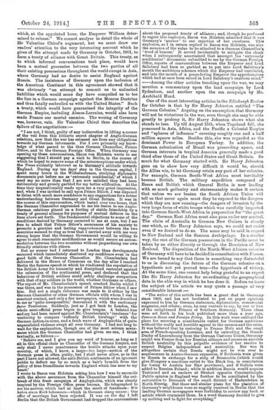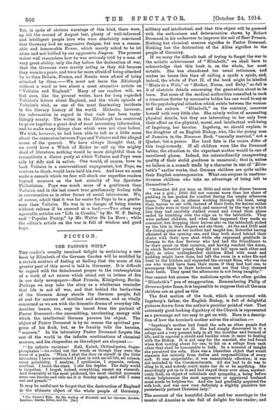THE QUARTERLIES.
THE Quarterly contains a most important article by Sir Valentine Chirol upon " The Origins of the Present War." It is in some ways the most amazing revelation of the tortuous and malignant methods of German statecraft that has yet appeared. Unless, indeed, we were absolutely assured, as we are, of Sir Valentine Chirol's judgment and caution as well of his good faith, we should hesitate to believe possible the story he tells, and should be inclined to think he must have deceived himself. Knowing, however, his accuracy and trustworthiness, we do not hesitate to assure our readers that they can implicitly trust his statements. Sir Valentine traces with the greatest conviction and force " the generation during the last twenty years in Germany of the forces • Forty Years in Brazil. By Frank Bennett. London: Mills and Boos. [10s. 6d. net.]
which, at the appointed hour, the Emperor William deter- mined to release." We cannot analyse in detail the whole of Sir Valentine Chirol's argument, but we must draw our readers' attention to the very interesting account which he gives of the attempt made by Germany in October, 1901, to
form a treaty of alliance with Great Britain. This treaty, as to which informal conversations took place, would have been a mutual guarantee between the two parties of all their existing possessions throughout the world except in Asia, where Germany had no desire to assist England against Russia. The insistence of Germany upon the inclusion of the American Continent in this agreement showed that it was obviously "an attempt to commit us to unlimited liabilities which would some day have compelled us to toe the line in a German campaign against the Monroe Doctrine and thus fatally embroiled us with the United States." Such a treaty, which would have guaranteed the integrity of the German Empire, including Alsace-Lorraine, would also have made France our mortal enemies. The wooing of Germany was, however, vain. Sir Valentine Chirol thus describes the failure of the negotiations :- "I am not, I think, guilty of any indiscretion in lifting a corner of the veil from this hitherto secret chapter of Anglo-German relations, now that the war has released me from any obligations towards my German informants. For I owe primarily my know- ledge of what passed to the then German Chancellor, Prince Billow, and to the German Foreign Office. When Germany was opening up these conversations, Baron von Holstein wrote to me suggesting that I should pay a visit to Berlin, in the course of which he hoped to remove some of the misconceptions under which the Times evidently laboured as to Germany's attitude towards England. During my ten days' stay in the German capital, I spent many hours in the Wilhelmstrasse, studying diplomatic documents put before me as extremely confidential,' of which I need say no more than that I am now satisfied they had been deliberately and grossly garbled for my better edification. At the time they unquestionably made upon me a very great impression, and, when I was invited to call upon Prince Billow, I was disposed to listen with much more confidence to any suggestions fora better understanding between Germany and Great Britain. It was in the course of this conversation, which lasted over two hours, that the German Chancellor expounded to me his desire to see Anglo- German relations placed on a footing of stable friendship by a treaty of general alliance for purposes of mutual defence on the lines above set forth. The fundamental objections to some of the conditions desired by Germany occurred to me at once, but I am free to admit that Prince Billow's assurances of his anxiety to promote a genuine and lasting rapprochement between the two countries seemed to ring so true that I carried away with me very strong hopes that the German Government would be willing to agree to such reasonable modifications as would secure an accom- modation between the two countries without jeopardising our own friendly relations with others. But no sooner had I returned to London than developments occurred which immediately shattered my confidence even in the good faith of the German Chancellor. Mr. Chamberlain had delivered in the House of Commons on the day after I reached Berlin the famous speech in which he vindicated the reputation of the British Army for humanity and disciplined restraint against the calumnies of the continental press, and declared that the behaviour of British soldiers could safely challenge comparison with that of any soldiers in the world, whether Germans or others. The report of Mr. Chamberlain's speech reached Berlin whilst I was there, and was in the possession of Prince Billow when I saw him. But not a single reference was made to it either by the German Chancellor or other German officials with whom I was in constant contact, and only a few newspapers, which were described to me as 'quite irresponsible,' denounced it with the customary furor Teutonicus. Suddenly, just as I got back to London, the whole semi-official press began to give tongue. A belated hue and cry had been raised against Mr. Chamberlain's ' insolence' for venturing to compare 'ruffianly British hirelings ' with the German nation-in-arms, and a fresh wave of Anglophobia of quite unparalleled violence swept all over Germany. I had not long to wait for the explanation, though one of the most solemn assur- ances which the German Chancellor had given me ran, I think textually, as follows Believe me, and I give you my word of honour, as long as I Bit in this official chair as Chancellor of the German Empire, not only shall I never countenance the hostile attacks upon your country, of which, I know, a large—too large—section of the German press is often guilty, but I shall never allow, as in the past I have not allowed, the anti-British sentiments of an ignorant public to deflect me by so much as a hair's breadth from the policy of true friendliness towards England which lies near to my heart.'
I wrote to Baron von Holstein asking him how I was to reconcile with the above assurance from the Chancellor himself the out- break of this fresh campaign of Anglophobia, which was clearly inspired by the Foreign Office press bureau. He telegraphed to me his answer, which had at least the merit of frankness : Wir haben einen Sorb bekommen—which in German slang means : Our offer of marriage has been rejected. It was on the day I left Berlin that the British Government had dropped the conversations about the proposed treaty of alliance ; and, though he professed to regret this explosion, Baron von Holstein admitted that it wag Germany's 'answer' to our rejection of her overtures. This explosion, as I in return replied to Baron von Holstein, was also the measure of the value to be attached to a German Chancellor's word of honour.' It served incidentally to mitigate the shock when I subsequently ascertained that amongst the extremely confidential' documents submitted to me by the German Foreign Office, reports of conversations between the Emperor and Lord Salisbury had been so garbled as to put into Lord Salisbury's month the ambitions schemes which the Emperor had ventilated, and into the mouth of a peace-loving Emperor the apprehensions which had at once been raised in Lord Salisbury's cautious mind."
—Among the other articles touching upon the war, we may mention a commentary upon the land campaign by Lord Sydenham, and another upon the sea campaign by Mr. Archibald Hurd.
One of the most interesting articles in the Edinburgh Ecriew for October is that by Sir Harry Johnston entitled " The
German Colonies." Arguing on the assumption that Germany will not be victorious in the war, even though she may be able greatly to prolong it, Sir Harry Johnston shows what she stands to lose. Up till August 15th, when Togoland fell, she possessed in Asia, Africa, and the Pacific a Colonial Empire and "spheres of influence" covering roughly one and a half million square miles. Besides this, she was regarded as the dominant Power in European Turkey. In addition, the German colonization of Brazil was proceeding apace, and German interests in tropical America generally made a good third after those of the United States and Great Britain. So much for what Germany started with. Sir Harry Johnston
goes on to show how very difficult it would be, should the Allies win, to let Germany retain any part of her colonies.
For example, German South-West Africa must inevitably become British. The military expedition composed of Boers and British which General Botha is now leading with so much gallantry and statesmanship makes it certain that unless we are beaten the South African Union will tell us that never again must they be exposed to the dangers which they are now running—the dangers of invasion by the very large force of white troops which was carefully imported into German South-West Africa in preparation for "the great day." German East Africa must also pass under our control. The claim of Australia to German New Guinea is clearly one which, as Sir Harry Johnston says, we could not resist even if we desired to do so. The same may be said in regard to New Zealand and the Samoan Archipelago. In a similar way, the rest of the German possessions in the Pacific must be taken by us either directly or through the Dominion of New
Zealand. The disposition of the North-West African colonies of Germany will have to be decided in consultation with France.
We are bound to say that there is something very distasteful to us in discussing the future of the German colonies on a. hypothesis not yet proved true—the hypothesis of victory.
At the same time, one cannot help being grateful to an expert like Sir Harry Johnston for co-ordinating the geographical data in the able way in which he has done it. Before we leave the subject of his article we may quote a passage of very considerable interest :—
"The writer of this article has been a great deal in Germany since 1909, and has not hesitated to put on paper opinions expressed to him by German statesmen, diplomatists, commercial magnates, and others ; even, he may venture to say, by one or two of the enlightened Princes of Southern Germany. These ideas were set forth in his book published more than a year ago, Common Sense and Foreign Policy. In this work were outlined the plans for securing a considerable outlet for German ambitions without the costly and horrible appeal to the cannon and the mine. It was believed that by restoring to France Metz and the small area of French-speaking Lorraine, and by extruding the Grand- Duchy of Luxembourg from the German Customs Union, Germany might win France from her Russian alliance and secure an amiable British neutrality by this palpable evidence of her resolve to respect Belgian independence and neutrality. Nor was it altogether certain that Russia might not be won over to acquiescence in Austro-German expansion, if Ruthenia were given to Russia in exchange for a strip of Bessarabia (which would give Hungary a maritime outlet to the Black Sea, in consolation for losing to Austria her Slav provinces), and if Galicia were added to Russian Poland ; while in addition Russia would acquire Trebizond and an enclave at Skutari opposite Constantinople. Public opinion in England was further to be conciliated by the restoration to Denmark of the small district of Hadersleben in North Slesvig. But these and similar plans for the placation of Germany's neighbours were so angrily received in Berlin that the leading German newspapers were forbidden to review any book or article which contained them. In a word Germany decided to give up nothing and to fight for everything." Yet, in spite of obvious warnings of this kind, there were, up till the second of August last, plenty of well-informed and intelligent people here who were absolutely convinced that Germany bad no aggressive designs, but was a reason- able and honourable Power, which merely asked to be let alone and not bullied by our aggressive Jingoes. The present writer well remembers how he was seriously told by a man of very great ability, only the day before the declaration of war, that the Germans were merely acting as they did because they were in a panic, and were far more afraid of being attacked by us than Britain, France, and Russia were afraid of being attacked by them.—We must not leave the Edinburgh without a word or two about a most attractive article on " Voltaire and England." Many of our readers will, we feel sure, like the present writer, have for long regarded Voltaire's letters about England, and the whole episode of Voltaire's visit, as one of the most fascinating incidents in the literary history of the world. Hitherto, however, the information in regard to that visit has been tanta- lizingly scanty. The writer in the Edinburgh has contrived to piece together a great deal of most interesting information and to make many things clear which were not clear before., We wish, however, he had been able to tell us a little more about the connexion between Pope and Voltaire and the alleged cause of the quarrel. We have always thought that, if we could have a Witch of Endor to call up the mighty dead of literature, nothing would be more delightful than to reconstitute a dinner party at which Voltaire and Pope were side by sido and in action, One would, of course, have to back Voltaire in a conversational engagement, but Pope, we venture to think, would have held his own. And here we must make a remark which we fear will shock our superfine readers beyond measure as the last atrocity of the Spectator Philistinism. Pope was much more of a gentleman than Voltaire, and in the last resort true gentlemanly feeling tells in conversation as in other forms of social intercourse. We, of course, admit that it was far easier for Pope to be a gentle- man than Voltaire. He was in no danger of being beaten without redress if he sneered at a lord.—Two other very agreeable articles are "Life in Croatia," by Mr. W. F. Bailey, and " Popular Poetry," by Mr. Walter De La Mare ; while the editor's article on the war is full of wisdom and good hope.




































 Previous page
Previous page